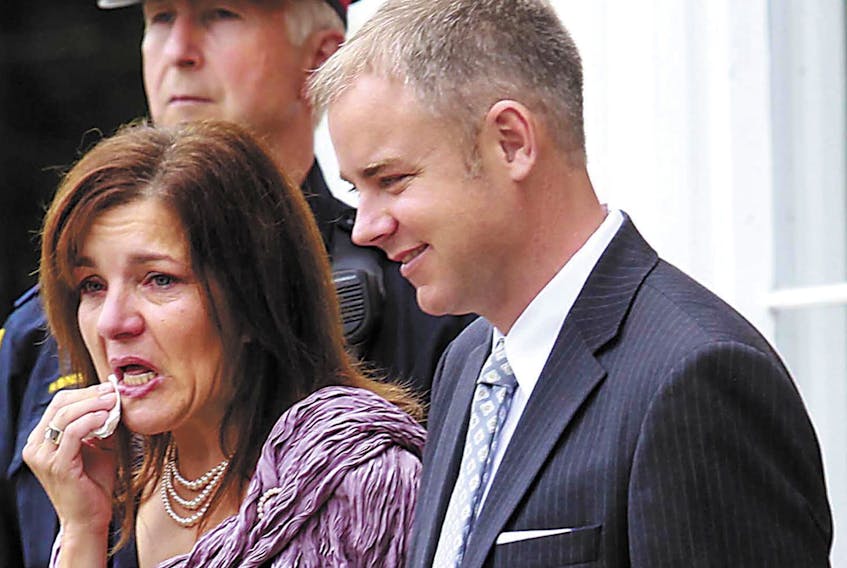Dennis Oland has been found not guilty of second-degree murder in the 2011 bludgeoning death of his multimillionaire father, Richard Oland, after a retrial in Saint John, N.B.
Justice Terrence Morrison of the New Brunswick Court of Queen’s Bench delivered the verdict Friday morning.
“This decision is all written out and from what I’ve skimmed, the judge is saying that Dennis Oland was not a totally plausible witness,” Greg Marquis, a university professor and Oland trial author, said of the acquittal.
He said the judge found “too many gaps, too many unknowns and too much reasonable doubt.
“It is not a black-and-white thing, but in the end reasonable doubt trumps everything.”
There were tears of joy from Dennis Oland and his family members as he hugged his defence team after the decision.
Richard Oland, 69, was killed by 45 blows with a hammer-like weapon in his Saint John office in July 2011. His skull was cracked in several places.
A jury found Dennis Oland guilty in December 2015 and he was sentenced to life in prison with no chance of parole for at least 10 years, but the Court of Appeal overturned the conviction in October 2016, citing an error in the trial judge's instructions to the jury.
The retrial in Saint John sat for 44 days spanning four months, heard from 61 witnesses and looked at 309 exhibits.
Marquis, who teaches criminal justice history and Canadian history at the University of New Brunswick at Saint John, wrote a book after the first trial titled The Death of Richard Oland and the Trial of Dennis Oland. A revised edition was published after the appeal decision.
“I was surprised at the verdict the first time,” Marquis said. “I had reasonable doubt, and I think a lot of people in the courtroom were surprised as well. Maybe I was reading too much into it, but I even thought the trial judge was a little surprised. The family was definitely surprised. It`s almost like they were not prepared for that outcome.”
Marquis said the first Oland trial was also the first jury trial that he ever sat in on.
“I just thought reasonable doubt,” he said. “What I was thinking of was as an academic and my dad had been a lawyer, and my dad always told me ‘there’s guilty and there’s legally guilty.’”
This time around, Marquis was determined to watch the trial with a more open mind, with no preconceived notion of the outcome.
“Knowing that reasonable doubt is the main principle in these cases, a little part of me in the back of my mind expected an acquittal (this time), but there have been a lot of surprises with this case,” he said
In the end, Marquis said, “the judge said there just wasn't enough there to prove beyond a reasonable doubt that Dennis killed his dad.”
The younger Oland’s financial problems provided a motive for the crime, the Crown had argued, but the defence countered that the Crown’s case was based on circumstantial evidence that didn’t add up.
Marquis said there was no evidence presented in either trial that pointed to another suspect.
“Maybe what the police could have done is look more into the victim’s financial dealings,” he said. “I don’t think they did a deep dive into that. We only heard the things that were brought to court, but when a wealthy person is murdered, aside from family, the second thing you think about, if it’s not a random thing, is some business deal or something from the past. Did that stuff get looked at? That’s a possible line of inquiry.``
He said rumours and tales of who the killer might be made the rounds in local coffee shops and bars, but nothing about that was entered into evidence.
Marquis said that a quotation police garnered when questioning one of Richard Oland’s two daughters made its way into court. Asked if Dick Oland had any enemies, the daughter said he could have had anyone for an enemy because of his abrasive personality, Marquis said.
“That didn’t really narrow things down,” he said.
Marquis said the Crown issued a statement saying they are studying the ruling.
“They have 30 days (to appeal). The Criminal Code kind of narrows the grounds for an appeal for the Crown. It’s limited to points of law only, whereas the defence can appeal on points of law and fact.
“I think it’s kind of rare for the Crown to appeal. I don’t think cost would be the issue.”
He said the possibility of civil litigation in the case has also been raised.









